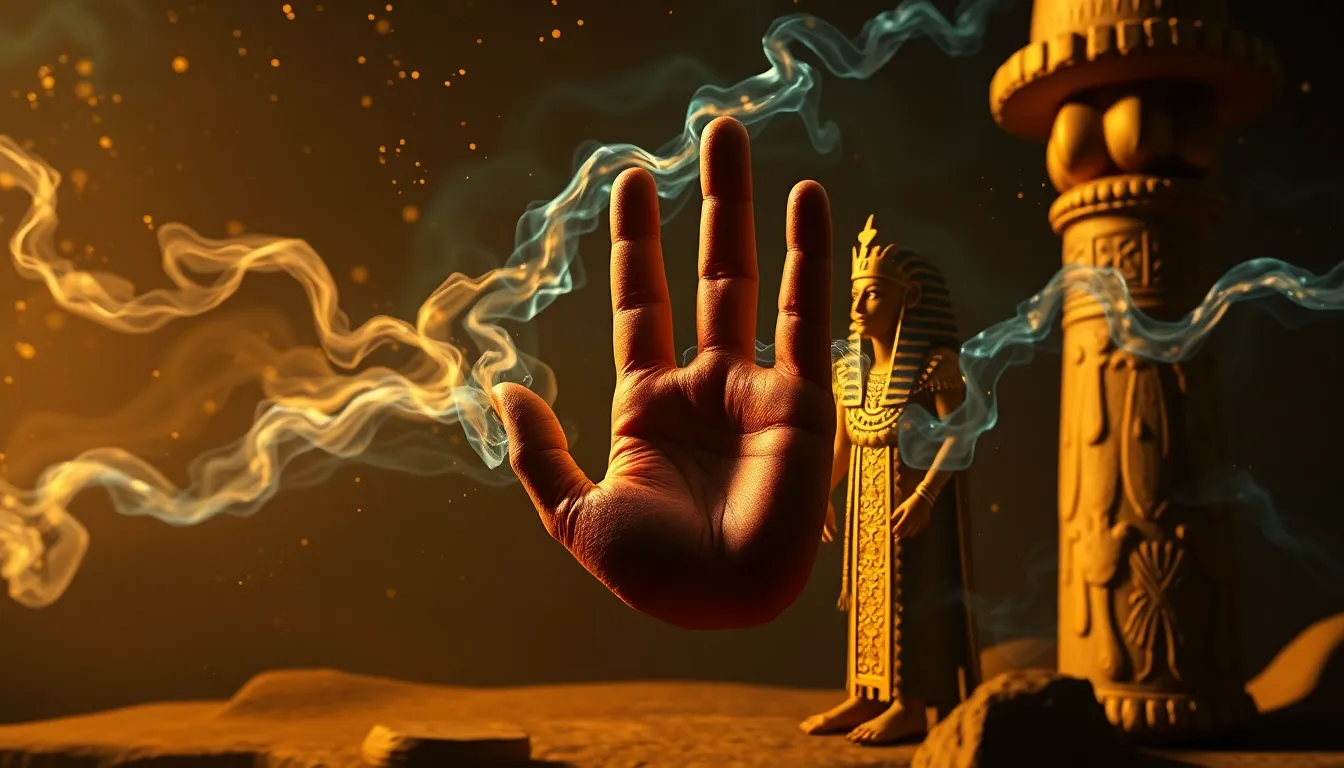The Unseen Hand: Divine Intervention in the Lives of Ancient Egyptians
I. Introduction
Divine intervention can be defined as the involvement of deities in the affairs of humans, influencing events, decisions, and outcomes in ways that reflect their will and purpose. In ancient cultures, this concept played a significant role in shaping societies and guiding the beliefs and practices of people.
In Ancient Egyptian society, divine intervention was of paramount importance. The Egyptians believed that their gods were intricately involved in every aspect of life, from the mundane to the monumental. This belief not only fostered a deep connection with the divine but also established a framework for understanding the world around them.
The purpose of this article is to explore the various manifestations of divine intervention in the lives of the Egyptians, examining the ways in which their gods interacted with humanity and impacted daily life, governance, warfare, and beliefs about the afterlife.
II. The Pantheon of Egyptian Deities
The Egyptian pantheon is rich and diverse, comprising numerous gods and goddesses, each with their own roles and attributes. Key figures include:
- Ra – The sun god, symbolizing creation and life.
- Isis – The goddess of magic and motherhood, known for her nurturing qualities.
- Osiris – The god of the underworld and resurrection, central to beliefs about the afterlife.
- Horus – The sky god, often depicted as a falcon, representing kingship and protection.
- Anubis – The god of mummification and the afterlife, guiding souls in the judgment process.
These deities were not only worshipped but also had specific roles in maintaining the cosmic order. Pharaohs were seen as divine intermediaries, connecting the gods with the people and ensuring that divine will was enacted on Earth.
III. Divine Intervention in Daily Life
The influence of the gods permeated every aspect of daily life in ancient Egypt. Agriculture, for instance, was heavily tied to divine favor:
- The annual flooding of the Nile was considered a blessing from the gods, essential for fertile soil.
- Rituals were performed to ensure a bountiful harvest, including offerings to gods like Osiris.
In addition, divine omens and signs played a crucial role in decision-making. Egyptians closely observed nature for signs, such as:
- The behavior of animals.
- Unusual weather patterns.
- Dreams interpreted as messages from the divine.
Rituals and practices aimed at seeking divine favor were common. These included:
- Daily offerings in temples.
- Festivals celebrating gods and their attributes.
- Personal prayers and invocations for guidance.
IV. Divine Guidance in Governance
The Pharaoh served as a divine intermediary, believed to be chosen by the gods to rule. This belief lent authority to their governance and decisions. Historical accounts reveal instances where divine signs influenced political decisions:
- Interpretations of celestial events as omens.
- Consultations with priests who acted as mediators between the divine and the Pharaoh.
Notable Pharaohs, such as Ramses II, often claimed divine support in their endeavors, portraying themselves as favored by gods like Amun. This divine backing was crucial in legitimizing their reigns and military campaigns.
V. Divine Intervention in Warfare
Warfare was another area where divine intervention was believed to be pivotal. The Egyptians held a profound belief in divine protection during battles:
- Soldiers often prayed to gods for strength and victory.
- Pharaohs would consult oracles before engaging in warfare.
Iconic battles, such as the Battle of Kadesh, illustrate the role of gods in military strategy. Pharaohs like Ramses II depicted battles as victories granted by the gods, influencing public perception and morale.
The impact of divine intervention on military successes and failures was significant, as defeats were often attributed to the gods’ displeasure, while victories reinforced the belief in divine favor.
VI. Afterlife Beliefs and Divine Judgment
The concept of Ma’at, representing cosmic order and truth, was central to Egyptian belief systems. The gods played a vital role in the judgment of souls, particularly in the afterlife:
- The heart of the deceased was weighed against the feather of Ma’at.
- Osiris presided over the judgment, determining the fate of souls.
Beliefs in divine intervention significantly influenced burial practices and tomb construction. Elaborate tombs were built to honor the deceased and ensure a safe passage to the afterlife, with artifacts and inscriptions aimed at appeasing the gods.
VII. Artistic and Literary Representations of Divine Intervention
The artistic and literary expressions of ancient Egypt provide rich insights into the nature of divine intervention. Temples and tombs were adorned with depictions of gods, showcasing their interactions with humans:
- Reliefs depicting Pharaohs in communion with gods.
- Statues representing deities, serving as focal points for worship.
Literary works, such as the “Book of the Dead,” reflect divine interactions with humanity, outlining the journey of the soul and the expectations of divine judgment.
Mythology played a crucial role in understanding divine influence, with stories illustrating the relationships between gods and humans, offering moral lessons and cultural values.
VIII. Conclusion
In summary, divine intervention was a fundamental aspect of ancient Egyptian culture, influencing various aspects of life, governance, warfare, and beliefs about the afterlife. The Egyptians’ profound connection with their deities shaped their worldview and legacy, imprinting a sense of divine purpose in their existence.
The enduring impact of these beliefs continues to resonate, offering insights into human experiences across cultures and the universal quest for meaning and understanding in the face of the unknown.




